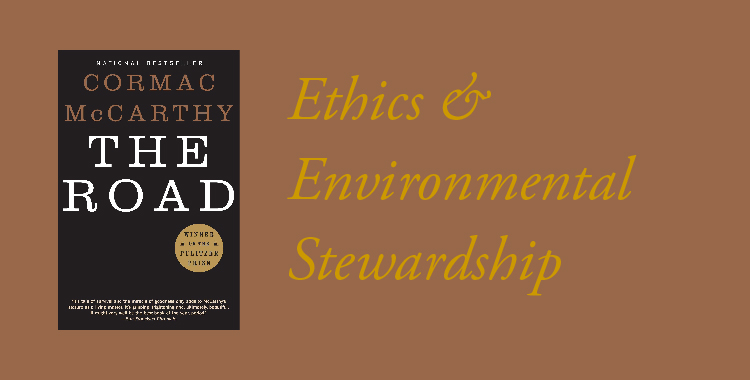One technique that McCarthy utilizes throughout the novel is the subversion of the traditionally “sublime” and “pastoral” scene. He accomplishes this feat by taking what has the potential to be beautiful imagery and turning it on its head. Take, for instance, this description of land that the man and boy encounter while making their way to the coast: “The land was gullied and eroded and barren. The bones of dead creatures sprawled in the washes. Middens of anonymous trash” (McCarthy 177). This description serves as the opening statement of a paragraph, setting the scene for the next plot point to run its course. It is at the beginning of a scene when most writers take the liberty to flesh out their settings, often doing so by conjuring up serene imagery that pleases the senses. Yet, rather than depicting beautiful scenery, McCarthy paints a setting that is better described as bleak and unsettling. While it can be argued that this description is a natural response to the type of landscape that McCarthy chooses to display as part of his dystopian vision, it is worth noting that his carefully chosen words are all too reminiscent of pleasant depictions of nature. “It was a beautiful day,” “the sun hung high in the sky,” and similar phrases are employed far too often in writing for this choice of words to be a mere coincidence. McCarthy’s phrasing is certainly a stylistic choice that further encourages readers to ponder the whereabouts of the devastated natural landscape.
At its core, The Road can be thought of as a commentary on the maltreatment of the environment. Since there are so few characters present within the novel, one might argue that nature itself serves as a key narrative component, often pushing the man and boy to continue on in their travels. In more ways than one, nature takes on the role of a villain, and the struggle between man and nature is frequently highlighted. Oftentimes, it is not another human being which threatens the lives of the two protagonists, but the environment, which is littered with ashes and smoke and contains little to no natural resources. Thus, the man and the boy find themselves in a nearly constant battle against nature for survival and wellbeing. Through this constant battle, McCarthy is likely making the point that, if humanity takes advantage of or mistreats the environment, then it should not expect the environment to be kind in return. Further supporting the notion of a symbiotic relationship shared between man and nature, The Road serves as a wake up call for people to be better stewards of the environment.
When approaching The Road from an angle of reader-response, it is important to consider the “horizon of expectations,” specifically when it comes to the genre in which McCarthy is working. One can go about this process by first identifying the themes and attributes that are commonly found within the genre. More often than not, dystopian literature carries with it a tone of intense bleakness and hopelessness, one that tends to linger until the end of the narrative. Nevertheless, The Road while still undoubtedly taking on a bleak tone, emits a remarkable sense of hopefulness. Regardless of what the man and the boy are faced with, both characters possess a powerful fighting spirit and will to live, something the man refers to as “carrying the fire (McCarthy 278). Even when the man becomes very ill and knows he will die soon, he travels on down the road with the boy, still doing everything in his power to protect the boy from others they may encounter. Likewise, even after his father’s death and he is left all alone, the boy chooses to carry on in his survival attempts and joins a new family. He never gives up. In response to the unique tone found within The Road, which somehow manages to emit hopefulness while retaining its bleakness, readers should feel pleasantly surprised and have their expectations subverted. In other words, McCarthy actively combats the “horizon of expectations,” successfully conveying a tone that is rarely found within dystopian literature.
In adhering to the conventions of the transactional analysis model, it is important to consider the ways in which one’s own experiences might affect the reading process, specifically in regard to tight-knit familial relationships (Purdue Owl). For instance, an adult, especially a male, who has a son, daughter, or child whom they are close to is likely to appreciate the story’s father-son relationship more than someone who doesn’t. By the same token, readers who have an estranged relationship with a parent or child are likely to be skeptical of the novel’s themes of familial love. This particular inverse relationship shared between reader and text proves to be a strong one. As a result, certain readers might not be able to pick up on McCarthy’s moral message as easily as others as they are likely to feel alienated by the novel’s fascination with the father-son relationship. This may not be the case if the story had more areas of focus besides the father-son relationship but, because there are so few characters and dialogue is used very sparingly, there is not much else to ponder beyond the greater implications of post-apocalyptic life, which are seldom explored.
Having said all that, what might a reader be able to infer about McCarthy’s meaning based solely on the text itself and personal life experiences? It would not be far fetched to interpret The Road as being a testament to the endurance of love in the midst of life threatening situations. After all, even when faced with brutal environments, starvation, and bloodthirsty travellers, both the man and the boy possess the willpower or “the fire” to withstand hardship till the very end. Arguably, the only reason either possesses this willpower is because they have each other. The man even tells the boy at one point that if the boy was to die, then he would want to die as well (McCarthy 11). In the same way, at the end of his father’s life, the boy admits that he would rather die with his father than go on living (McCarthy 278). Yet, because he knows that his father will be with him in spirit, the boy chooses to carry on the fire. It is a deep love for each other that enables both the man and the boy to survive for so long (Hamilton). If they did not have each other, they never would have made it half as far as they did.
Regardless of the way in which a reader interprets a text, there is no denying that a reader’s personal experiences will inevitably either enhance or stifle their comprehension of McCarthy’s moral message. Readers who have had positive experiences with familial relationships are likely to be more accepting of this message, while readers who have not had positive experiences may feel alienated by it. Whatever the case may be, it stands to reason that McCarthy is a strong proponent of the notion that familial love is powerful enough to overcome almost any hardship. This idea is supported by the fact that the entirety of The Road focuses in on a singular tight-knit familial relationship, and it is this relationship that ultimately pushes both protagonists to survive until the end of the story.
Finally, after having analyzed The Road using the theories of psychoanalysis, ecocriticism, and reader-response, one can begin the more challenging task of deconstructing the work. One of McCarthy’s most stylistic choices is realized in his own deconstruction of language and grammar (Culler). Rather than adhering to the traditional conventions of punctuation, and the separation of dialogue via quotations, McCarthy forgoes these conventions altogether, turning The Road into a broken albeit compelling reading experience. Additionally, this choice influences far more than just the tone and formatting of the novel: it serves as a metaphor for the breakdown of reality (Wielenberg). In more ways than one, the man and the boy live in a sort of “post-world” existence. The norms and conventions of the previous world have all but ceased to exist and, in this new state of existence, no one is quite sure how they are to handle themselves (Wielenberg). As food and resources are in short supply, the remaining travellers on earth are desperate to survive no matter what the cost. As a result, morale is negated, and human beings are willing to fight, murder, and even cannibalize each other. Breaking the rules of grammar and punctuation is a fascinating way to highlight this moral decline. It calls into question why there are rules set in place to begin with, and this haunting idea translates beautifully into the existential pondering that appears all throughout the narrative.
Upon contemplating the themes of The Road, it becomes quickly apparent that one of the novel’s most compelling concepts takes on the form of a binary opposition: meaningfulness vs meaninglessness (Hamilton). This concept can be found all throughout the narrative, especially when the two protagonists interact with other survivors. Take, for instance, this moment in which the man and the boy discuss evidence for the existence of God with Ely: “I guess God would know it. Is that it?” asks the boy, followed by Ely’s somber response: “There is no God.” After having struggled to survive for years in a post apocalyptic world, Ely is visibly jaded and believes that life is meaningless. In contrast, the boy, who is relatively naive and inexperienced in life, carries with him a subtle belief in God and the greater good (Hamilton). This is just one example of meaningfulness vs meaninglessness, manifested in the boy’s optimism and Ely’s borderline nihilistic outlook (Spurgeon). The presence of this binary opposition within the novel should prompt readers to question for themselves the reality of their own existence and contemplate whether or not commonly held beliefs about such a matter can be trusted.
Ironically enough, whereas the aporias of other works tend to signify the point at which a text loses all meaning, the aporia of The Road arguably signifies a deeper meaning hidden within the text (Hamilton). Due to the debase morality that humanity exhibits time and time again, the broken grammatical conventions utilized, and the grim nature of the story, many readers assume that McCarthy is arguing in favor of nihilism (Culler). Yet, these readers fail to consider the story’s ending, which radiates hope rather than meaninglessness. If McCarthy truly believed in the bleak worldview conveyed by the rest of the story, then he would likely choose to end his novel on a more despondent note, perhaps killing both the man and the boy instead of having the boy carry on with his life. Yet, he instead not only allows the boy to survive, but offers him a second opportunity to be part of a family (McCarthy 282). This hopeful ending contradicts the bleak tone perpetuated by the rest of the novel. As a result, The Road takes on an entirely new meaning, one that falls in line with the moral message that McCarthy is trying to convey beneath the themes of existentialism and ambiguity.
Having said that, what exactly is McCarthy trying to convey with his contradicting themes and worldviews? Ultimately, despite the noticeable presence of postmodern thought found within The Road, McCarthy is conveying the idea that life does indeed have meaning (Ghaderi). Not only does it have meaning, but each and every person, regardless of circumstance, is called to a specific purpose: to take good care of the planet and the people living on it. The apocalypse that occurs before the beginning of the novel is heavily implied to have been caused by either nature itself or some widespread human conflict. It stands as a testament to what the world is liable to become if people ever decide to stop taking care of it (Spurgeon). This idea extends to both nature and humanity itself. Through the various bleak plot points that occur throughout the book, the reader can feel sure about two things, if nothing else: first of all, the reader can feel confident that, if humanity doesn’t take upon itself the responsibility to be good stewards of nature, then nature is likely to overtake humanity (Oppermann). Secondly, mistreatment of fellow human beings will often result in one’s own undoing. It is vitally important that each and every person take care of each other lest everyone succumb to their own selfish desires, resulting in humanity’s collective demise.
In conclusion, while the themes of existentialism and nihilism are indeed explored within the novel, The Road conveys an objective moral message about humanity’s place among both nature and its own kind. Simply put, if humanity chooses to misuse and scour the earth and its inhabitants, then it cannot expect either to be kind in return. Additionally, McCarthy utilizes this rather drastic warning to communicate an appropriate response: the idea that love is powerful enough not only to withstand hardship, but to unite human beings with each other and nature.
***
Works Cited
Cremean, David N. “Cormac McCarthy.” Critical Insights, 2013. EBSCOhost, http://eds.b.ebscohost.com.dsc.idm.oclc.org/eds/results?vid=0&sid=da75e90c-3619-4c63-9383-5fabedfbcf7a%40pdc-v-sessmgr05&bquery=Cormac%2BMcCarthy&bdata=JnR5cGU9MCZzZWFyY2hNb2RlPUFuZCZzaXRlPWVkcy1saXZlJnNjb3BlPXNpdGU%3d.
Culler D. Jonathan. “On Deconstruction: Theory and Criticism After Structuralism.” Cornell University Press, 2007. EBSCOhost, http://eds.b.ebscohost.com.dsc.idm.oclc.org/eds/ebookviewer/ebook/bmxlYmtfXzg4MTY4MV9fQU41?sid=da75e90c-3619-4c63-9383-5fabedfbcf7a@pdc-v-sessmgr05&vid=1&format=EB&rid=1.
Dent, Loren, and Christian, Christopher. “The Shifting Prevalence of Conflict in Psychoanalytic Literature: A Brief Report of a Corpus-Based Text Analysis,” Psychoanalytic Psychology, 2019. Educational Publishing Foundation. GALILEO, http://eds.b.ebscohost.com.dsc.idm.oclc.org/eds/ebookviewer/ebook/bmxlYmtfXzg4MTY4MV9fQU41?sid=da75e90c-3619-4c63-9383-5fabedfbcf7a@pdc-v-sessmgr05&vid=1&format=EB&rid=1.
Ghaderi, Ali, and Taghizadeh, Ali. “Faith and Reason in the Mad Subjectivity: Cormac McCarthy’s Post-apocalyptic Narrative ‘The Road.’” GEMA Online Journal of Language Studies, Vol. 16, pp. 173-185, 2016. Literary Criticism, http://eds.a.ebscohost.com.dsc.idm.oclc.org/eds/detail/detail?vid=3&sid=ee507ebc-1fda-45d3-82ba-817bf15cd8ee%40sdc-v-sessmgr05&bdata=JnNpdGU9ZWRzLWxpdmUmc2NvcGU9c2l0ZQ%3d%3d#AN=116434946&db=ufh.
Hamilton, Geoff. “Something to Be Done: The Road, Beckett, and American Autonomy,” Canadian Review of American Studies, 2017. GALILEO, http://eds.b.ebscohost.com.dsc.idm.oclc.org/eds/pdfviewer/pdfviewer?vid=3&sid=6c019d57-9cf8-48fb-a70a-9fa310ad8b7f%40sessionmgr101.
Lilly, James D. “Cormac McCarthy: New Directions.” University of New Mexico Press, 2014. EBSCOhost, http://eds.a.ebscohost.com.dsc.idm.oclc.org/eds/detail/detail?vid=1&sid=b8906099-dd3d-4430-8a78-7e8e81098cb8%40sdc-v-sessmgr01&bdata=JnNpdGU9ZWRzLWxpdmUmc2NvcGU9c2l0ZQ%3d%3d#AN=686739&db=nlebk.
McCarthy, Cormac. The Road. New York, Random House, Inc., 2006.
Oppermann, Serpil and Iovino, Serenella. “Material Ecocriticism.” Indiana University Press, 2014. EBSCOhost, http://eds.a.ebscohost.com.dsc.idm.oclc.org/eds/ebookviewer/ebook/bmxlYmtfXzEwNDk3MTNfX0FO0?sid=b8906099-dd3d-4430-8a78-7e8e81098cb8@sdc-v-sessmgr01&vid=2&format=EB&rid=4.
“Reader-Response Criticism.” PurdueOwl, https://owl.purdue.edu/owl/subject_specific_writing/writing_in_literature/literary_theory_and_schools_of_criticism/reader_response_criticism.html.
Spurgeon, Sara L. “Cormac McCarthy: All the Pretty Horses, No Country for Old Men, The Road.” Studies in Contemporary North American Fiction, 2011. EBSCOhost, http://eds.a.ebscohost.com.dsc.idm.oclc.org/eds/ebookviewer/ebook/bmxlYmtfXzM2ODUxM19fQU41?sid=b8906099-dd3d-4430-8a78-7e8e81098cb8@sdc-v-sessmgr01&vid=3&format=EB&rid=1.Wielenberg, Erik T. “God, Morality, and Meaning in Cormac McCarthy’s ‘The Road’”, The Cormac McCarthy Journal vol. 8 no. 1 pp. 1-19, 2010. jstor.org/stable/42909407.
***





